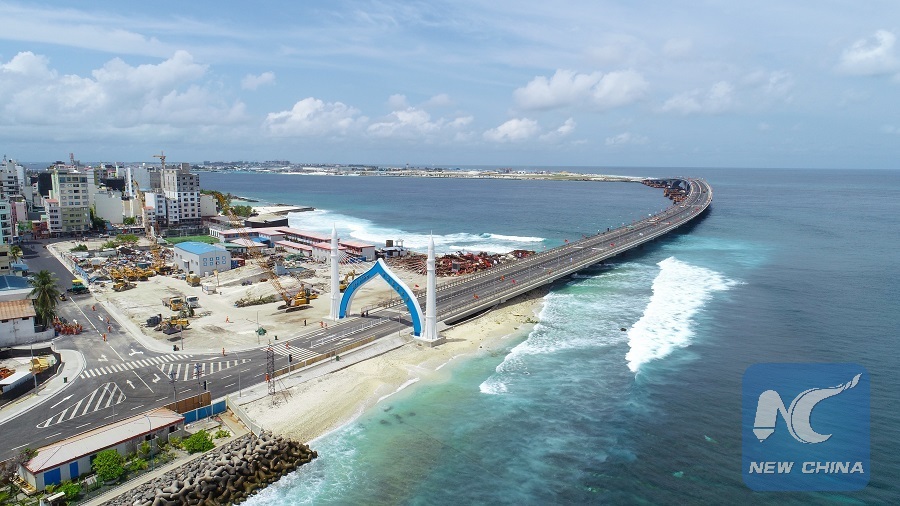Maldives election: A turbulent road ahead for democratic consolidation
- By Niranjan Sahoo
 0 Comment(s)
0 Comment(s) Print
Print E-mail China.org.cn, October 25, 2018
E-mail China.org.cn, October 25, 2018

On September 23, the Maldives held its third presidential election since it became a democracy in 2008. Contrary to widely held speculation that the elections in the Indian Ocean archipelago would be rigged by the incumbent government, the election was a relatively smooth affair. The crucial presidential election, which saw a record 90 percent voter turnout, went heavily against the incumbent President Abdullah Gayoom Yameen and the winner was the united opposition candidate Ibrahim Mohamed Solih. With the country's election commission certifying opposition candidate Solih as the winner, the Maldives now awaits an orderly and peaceful transfer of power in mid-November.
The third presidential election was significant for various reasons. First, the September poll was made out to be a sort of referendum on Yameen's five-year eventful tenure. The incumbent president was accused of repressing the media, influencing governance institutions such as the electoral commission and judiciary, restricting civil society and targeting political opponents on various dubious grounds to remain in power for a longer period of time. What had added more spark to the fray was Yameen's recent measures on national emergency that saw the arrest of two judges by the Male police.
Second, on the eve of election, Maldives society saw a near total polarization of the country – Yameen versus the rest. After former president Mohamed Nasheed pulled out of the race after the country's election commission debarred him from the fray, the entire opposition including arch-rival, the Islamist Adhaalath Party, supported the Maldivian Democratic Party (MDP)'s candidate Solih.
Finally, the election witnessed the unprecedented resurgence of civil society and ordinary voters demanded better performance and accountability from their elected representatives. The surest proof of that was a record 90 percent voter turnout.
Challenges ahead
Solih, the president-elect who will assume office in mid-November has an uphill battle ahead of him. First, the new president would have to fight hard to get a firm grip over the critical civil and military administration that remain steadfastly loyal to the incumbent president. This is especially pronounced in a tiny country where most of the democratic institutions are politicized. For Solih to salvage the country's democratic institutions, especially the judiciary and election commission, he has to show his political skills.
Second, the president-elect will find it tough to keep his rag-tag coalition partners together. The fact of the matter is that the united opposition was cobbled together in the last minute to defeat Yameen. This includes two fierce political rivals, Abdullah Gayoom and Mohamed Nasheed, both former presidents as well as two unlikely parties – Adhaalath Party, a religious party with its radical Islamic agenda, and Jumhooree Party run by business tycoon Qasim Ibrahim. Interestingly, this is the same combination that helped Yameen defeat Nasheed in the 2013 presidential polls.
Third, Solih has a very tough challenge of delivering on economic growth and catering to the growing aspirations of this young country.
Fourth, this tiny island nation faces serious threats from growing Islamic radicalization. A worrisome development is that several ISIS recruits have turned out to be from the Maldives. Solih has to work hard to de-radicalize youths and keep the country safe from the growing tentacles of Sunni-Wahabism.
Finally, the president-elect has to also carefully navigate the emerging geopolitics in the region, especially in managing his government's engagement with China and India. The new government should shun the path of taking sides and maintain a cordial relationship with both Asian giants for its own growth and stability.
To conclude, the Maldives made a smooth transition to democracy a decade ago. Yet, the developments in the last few years have cast strong doubts on its democracy. Its voters have finally given another shot at democracy and it will be up to Solih and his rag-tag coalition partners to steer the country to a safe zone.
Niranjan Sahoo is Senior Fellow, Observer Research Foundation, New Delhi.
Opinion articles reflect the views of their authors, not necessarily those of China.org.cn.





